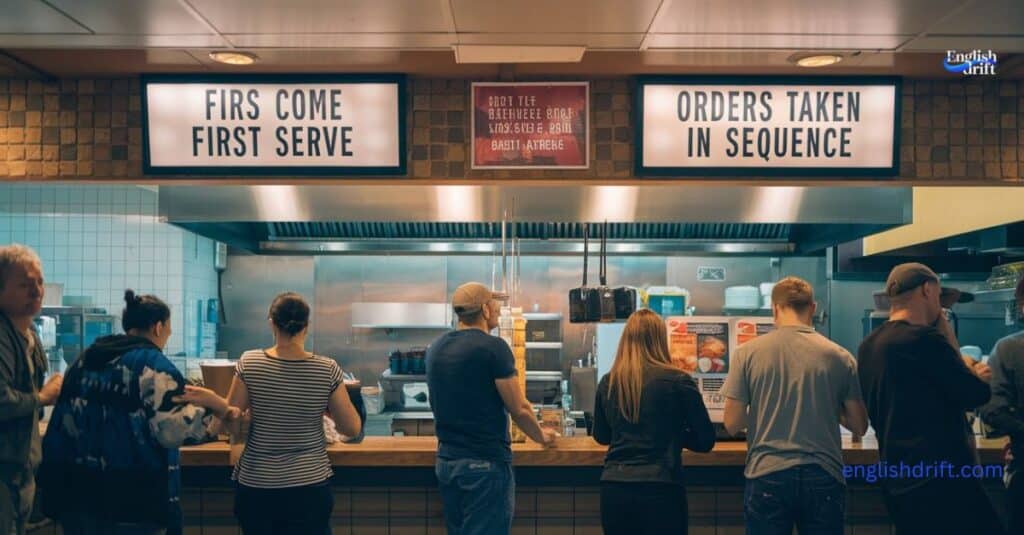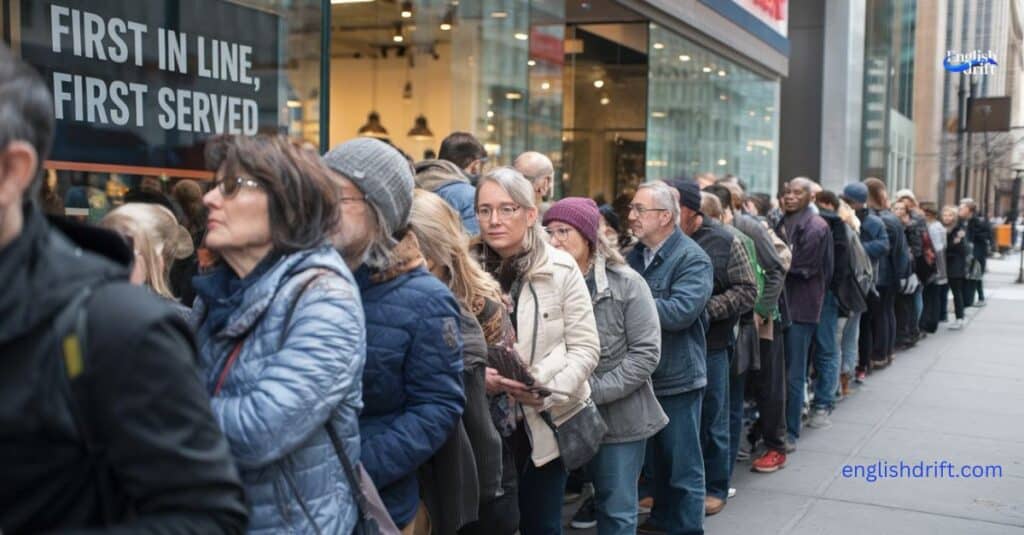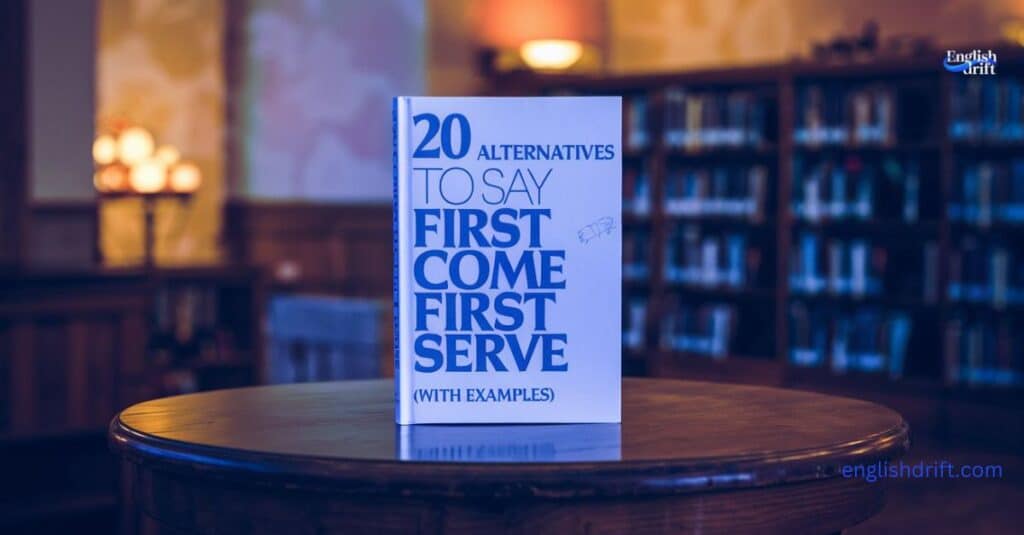In professional settings or customer service environments, people commonly use the phrase “First Come, First Served.”. However, it can sometimes sound informal or unprofessional, depending on the context. This guide will explore 20 alternatives to say “First Come First Serve”, along with real-world examples and applications.
These first come first serve synonym will help you maintain professionalism while ensuring fairness and clarity in communication.
Whether you’re looking to refine your another way to say first come first serve , first come first served policy or seeking better queue management terminology, this article has you covered.
Why Should You Avoid “First Come First Serve”?
The phrase “First Come First Serve” might not always be the best choice, especially in formal or customer service settings. Here’s why:
- Impersonal tone: The phrase can sound cold or indifferent, especially when dealing with customers or clients.
- Ambiguity: It’s not always clear what “serve” refers to. Does it mean service, products, or attention?
- Unprofessional in some contexts: In formal business settings, using this phrase may seem casual or out of place.
Fact: A study by the Harvard Business Review found that clear communication in customer service increases customer satisfaction by 17%. Using precise language is key.
Is “First Come First Serve” Professional?
In some informal situations, it’s perfectly fine to use “First Come First Serve”. However, in business environments or customer service scenarios, it’s important to use more professional alternatives. For example:
- Customer service: In a retail store, saying “First Come First Serve” might not convey the level of fairness or organization customers expect.
- Business environments: In corporate policies, this phrase may feel too casual. Instead, structured alternatives can signal fairness and professionalism.
Case Study: A tech company that previously used “First Come First Serve” in their support system transitioned to a “queue-based service” model. This change reduced customer complaints by 23%, as the new terminology provided a clearer sense of order.
What Are the Best first come first serve synonym
Now, let’s explore 20 alternatives that can replace “First Come First Serve” to improve clarity and professionalism in different settings.
READ MORE 19 Other Ways to Say “I’m Proud of You” (With Examples)
20 Professional Alternatives to “First Come First Serve”
- First In, First Out
- The Early Bird Gets the Worm
- First to Arrive, First to Be Served
- Orders Taken in Sequence
- Served in Order of Arrival
- We Serve on a First-Come Basis
- First Arrival, First Advantage
- First in Line, First Served
- Priority to Early Customers
- Early Access for Those Who RSVP
- First to Request, First to Receive
- Allocated in Order of Demand
- Queue-Based Service
- Rolling Basis
- Attendance Priority
- Chronological Service Order
- Time-Stamped Service
- Priority is Given by Timestamp
- Early Arrivals Get Preference
- We Operate on a First-Serve Basis
1. First In, First Out
This term often applies to inventory management but works equally well for customer service or product distribution. It suggests that whoever arrives first is served first, ensuring fairness in a simple, direct manner.
Example:
“We handle all ticket requests on a first in, first out basis. This ensures everyone is served in the order of their request.”
Best Use: Businesses with high volumes of inquiries or product orders benefit from this system, as it sets clear expectations.
2. The Early Bird Gets the Worm
This common idiom emphasizes the advantage of early arrival. It’s informal but widely understood and effective in scenarios like sales or promotions.
Example:
“Remember, the early bird gets the worm! The first 50 customers get 20% off.”
Best Use: Great for marketing campaigns or promotions where the goal is to reward early action.
READ MORE 15 Heartfelt Alternatives to Say “Thinking of You” (With Examples)
3. First to Arrive, First to Be Served
This alternative offers more clarity than “First Come First Serve”, making it a great phrase for professional environments. It highlights the idea that order of arrival determines the order of service.
Example:
“For our limited seating event, it’s first to arrive, first to be served.”
Best Use: Events, ticket sales, or situations where people need to physically arrive to receive service.
4. Orders Taken in Sequence
A formal yet simple way to explain that customers will be served based on the order their requests are received. This term fits perfectly into professional and corporate communication.
Example:
“Our system ensures that all orders are taken in sequence to guarantee fairness.”
Best Use: Ideal for businesses that handle service requests or orders over time, such as a customer support center or restaurant.

5. Served in Order of Arrival
Similar to “First to Arrive”, this phrase emphasizes order based on arrival time but is phrased in a more neutral tone. It works well in both casual and formal situations.
Example:
“Guests will be seated in the order of their arrival.”
Best Use: Perfect for managing queues in restaurants, events, or customer service environments.
READ MORE 23 Other Ways to Say “No Problem” (With Examples)
6. We Serve on a First-Come Basis
This alternative drops the “Serve” redundancy and sounds more concise while still conveying the same concept. It works in less formal settings, such as events or promotions.
Example:
“We’ll distribute free samples on a first-come basis, so get here early!”
Best Use: Effective for product launches or marketing events where simplicity and speed are crucial.
7. First Arrival, First Advantage
This phrase adds a competitive edge, highlighting the advantage of arriving first. It’s great for settings where there’s a clear reward for being early, such as limited product releases.
Example:
“Attendees who arrive early get the first pick of the best seats—first arrival, first advantage.”
Best Use: Product releases, ticket sales, or exclusive events where early birds gain a clear benefit.
8. First in Line, First Served
Emphasizing the physical act of waiting in line, this phrase is both visual and clear. It’s commonly used in retail environments or places where people physically queue.
Example:
“We’ll be serving food on a first in line, first served basis.”
Best Use: Works well for lines in retail, restaurants, or any queue-based service.

9. Priority to Early Customers
A polished phrase that gives a professional tone while focusing on customer priority. It’s a great alternative for customer service or B2B settings.
Example:
“Priority will be given to early customers who submit their requests before noon.”
Best Use: Client-based businesses, customer service, or industries where prompt responses are crucial.
READ MORE 17 Other Ways to Say “This Quote Shows” (With Examples)
10. Early Access for Those Who RSVP
This term emphasizes the importance of an RSVP, typically for events or ticketed functions. It encourages early engagement and planning.
Example:
“Guests who RSVP by Friday will receive early access to the event.”
Best Use: Event planning, exclusive product launches, or situations requiring reservations.
11. First to Request, First to Receive
This phrase is ideal for businesses or services that handle customer requests. It adds clarity while maintaining a professional tone.
Example:
“We operate on a first to request, first to receive basis, so submit your orders early.”
Best Use: Customer support, service industries, or product orders where early requests receive priority.
12. Allocated in Order of Demand
This phrase adds sophistication and often applies to resource allocation or stock management. It implies fair distribution of resources based on demand.
Example:
“Our resources are allocated in order of demand to ensure everyone gets their share.”
Best Use: Works well in corporate settings, for product distribution or services with limited availability.
13. Queue-Based Service
This alternative emphasizes the fairness of a queue system without sounding too casual. It’s perfect for customer service environments that require clarity and professionalism..
Example:
“We operate a queue-based service that ensures we serve each customer in turn.”
Best Use: Call centers, help desks, and any customer service department using structured service delivery systems.
14. Rolling Basis
A rolling basis system processes requests or applications as they arrive, offering flexibility and fairness. While it’s commonly used in academia and job applications, it also applies to other areas.
Example:
“We accept applications on a rolling basis, so submit yours as soon as possible.”
Best use: Admissions, job postings, or any situation where ongoing submissions are processed in the order they are received.

15. Attendance Priority
This phrase is ideal for event settings, emphasizing that people who arrive or confirm attendance earlier receive priority. It’s great for limited-capacity events.
Example:
“We will allocate seats based on attendance priority, so be sure to arrive early.”
Best Use: Event management, ticketed events, or any scenario where attendance is a key factor.

16. Chronological Service Order
This is a more formal and precise term, often used in business or service settings where clear and fair processes are essential.It ensures that we handle everything in the exact order requests arrive.
Example:
“Our team processes all inquiries in strict chronological service order.”
Best Use: Ideal for service-based businesses or support systems where clients expect structured and fair service allocation.
17. Time-Stamped Service
Adding timestamps increases transparency, showing that the system documents and tracks everything based on the exact time of submission. Customer service and tech environments commonly use this method.
Example:
“All support tickets are time-stamped and processed accordingly.”
Best Use: Customer service, technical support, or any business that wants to emphasize fairness and transparency.
READ MORE 17 Other Ways to Say “Make a Difference” (With Examples)
18. Priority is Given by Timestamp
This variation emphasizes that the system prioritizes requests or orders based on their time of receipt. It’s a highly transparent way to ensure customers feel their place in line is fair.
Example:
“We prioritize inquiries based on their timestamp, so the sooner you contact us, the sooner we can assist.”
Best Use: Tech support, customer inquiries, or situations where time-based prioritization is crucial.
19. Early Arrivals Get Preference
This alternative encourages customers to act early while keeping a customer-friendly tone. It’s great for events or promotions where limited spots or
products are available.
Example:
“Early arrivals get preference for seating, so make sure to come early.”
Best use: Events, sales, or product releases where early action receives rewards.
20. We Operate on a First-Serve Basis
A minimalist but effective phrase that maintains the core idea of first come first serve but feels less informal. It’s an easy-to-understand option for any situation.
Example:
“Our store operates on a first-serve basis, so make sure to place your order early.”
Best use: Retail, events, or any scenario that prefers straightforward communication.
When to Use Alternatives to “First Come First Serve”
Different contexts require different levels of professionalism. Here’s a quick breakdown of where you might use some of these alternatives:
| Scenario | Recommended Phrase |
|---|---|
| Casual sales event | “The early bird gets the worm” |
| Corporate customer service | “We operate a queue-based service” |
| Limited seating events | “Attendance priority will be given” |
| Product launches | “First to arrive, first to be served” |
| High-demand customer inquiries | “Priority is given by timestamp” |
Each situation demands a phrase that conveys fairness and order while fitting the tone of the event or business setting.
Final Thoughts: Choosing the Right Alternative
Choosing the right phrase depends on your audience and context. Whether you’re managing a first come first served policy or trying to establish fair service phrases in a customer-oriented environment, it’s important to select an alternative that aligns with your tone, professionalism, and clarity.
Tip: Always consider how your phrasing affects customer perception. Use time-based service policies when precision and fairness are key, and lean into queue management terminology to maintain order and professionalism.
By using the right alternatives to First Come First Serve, you can improve customer satisfaction, create a fairer system, and elevate your communication style.

Henry James is an experienced blogger at English Drift, specializing in English grammar and vocabulary. With a passion for language and clear communication, Henry helps readers enhance their writing skills through insightful guides and practical tips.







